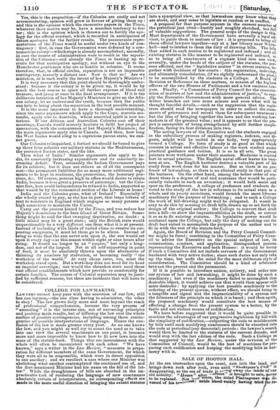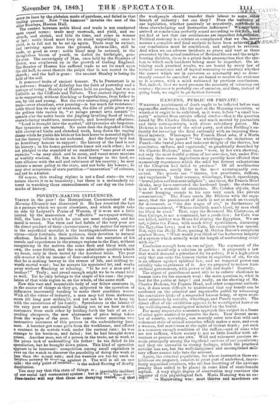SALE OF HOOTON HALL.
As the sea encroaches upon the coast, eats into the land, and brings down rock after rock, even until "Shakspeee's Ouse" is disappearing, so the sea of trade in eerseg away the lands of our old nobility. e House" aft, -arouse" is brought to sale, ever to be replaced. Not 1,s. since, the titled Plantagenet w4.s di- vested of his te,,,,,,aerl; noble blood vainly having tried to re-
cover its land by the plebeian mode of purchase, and failed in that trading process. Now "the hammer " invades the seat of the elder Stanleye, Houton Hall. The contest between noble blood and trade is not conducted upon equal terms : trade may encroach, and yield, and en-
croach, and shrnah, and bide its time, and come in winner at last : noble blood must keep its stand unyielding ; once to Yield, is to fall not to be set up again. Trade may be extinct, and reviving again from the around, Antteus-like, still be trade, as good as ever : noble blood may be seduced, in the thoughtless bloom of youth, to forfeit its birthright, gone for ever. The sovereignty of Alan, once held by the Stanleys of Derby, was swallowed up in the growth of trading England. The Stanley-of Hooton has suffered trade to set its mark upon the old hall, to erect therein the pulpit that is not sacred to the church ; and the hall is gone : the ancient Stanley is losing its hold of the soil.
It possessed traits of ancient honour. To be Protestant is to be parvenu : Stanley of Alderley has the faith of yesterday and a peerage of today; Stanley of Hooton held no peerage, but was as Catholic as the Cliffords and Talbots. That ancient dignity was to be supported, without flinching or forgetfulness, from father to eon, by old and young. But the ever-encroaching golden sea of trade—ever abundant, ever pressing—is too much for resistance : noble blood has its day of weakness, the dike of pride gives way, the golden tide rushes in, " et pelago premit arva sonanti "- spreads o'er the noble lands the jingling levelling flood of trade, overwhelming traditions, monuments, and hereditary affections.
"Land is brought into the market," old tyrannies are forgotten. New tyrannies are learned. No more does the degraded villein, with convubei limbs and clenched teeth, keep down, the raging shame while he yields his bride or his best horse to manorial rights; but the factory villein is not unbound. And the factory lord has no hereditary honour to support : the history of the land is not his history ; in his house generations know not each other ; he is not pledged to the standard of an escutcheon "sans peur et sans reproche "—he may slink and be mean, and vaunt mean maxims as worldly wisdom. He has no fixed hostage in the land, no born alliance with the soil and substance of his country ; he may tolerate a mean policy in the state, and not belie his tenure ; he may abet misprision of state partition—" annexation" of colonies, and not be a traitor.
Of course, this trading regime is not a final state—its very nature shows it to be transitory ; but there is a melancholy in- terest in watching these encroachments of our day on the land- marks of history.



























 Previous page
Previous page